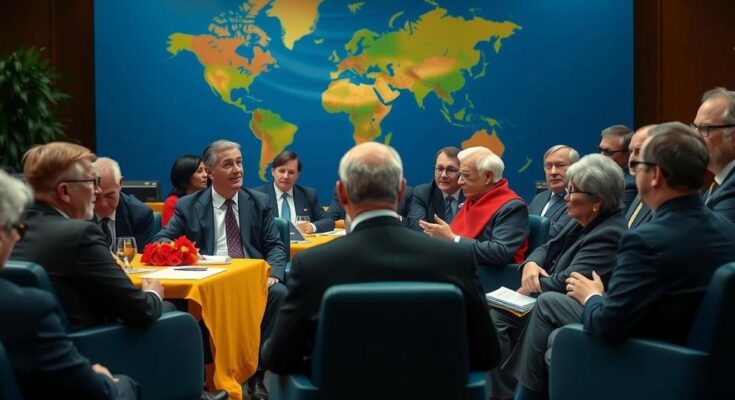On the final day of the G20 summit, leaders engaged in discussions on sustainable development and climate finance to enhance global warming negotiations before the upcoming COP29 talks in Azerbaijan. A joint statement called for substantial increases in climate finance, emphasizing accountability from both developed and developing nations.
On the concluding day of their summit on Tuesday, G20 leaders convened to advance the discussion on sustainable development and the transition to cleaner energy. With the intention of bolstering prospects for a fruitful agreement regarding global warming, leaders aimed to send a reassuring message to the forthcoming COP29 climate talks in Azerbaijan. The urgency of their mission was underscored by a plea from the COP29 host, emphasizing the necessity for G20 nations to demonstrate a commitment to climate action and provide concrete directives to revitalize negotiations in Baku. As the globe faces a potential record-high temperature year, the G20 leaders are motivated to intensify climate action ahead of Donald Trump’s anticipated return to the U.S. presidency in January, a move that raises concerns regarding the future of U.S. participation in the Paris Agreement and other climate initiatives. In a joint communiqué released on Monday, the G20 leaders underscored the imperative of “rapidly and substantially increasing climate finance from billions to trillions from all sources” to address the escalating climate crisis. They concurred that negotiators at COP29 must formulate a new financial objective that specifies the financial obligations of developed nations to support developing countries in climate financing. Economists have estimated that this goal should ideally reach a minimum of $1 trillion annually. Discussions surrounding climate finance remain contentious, particularly regarding the call for richer developing countries, such as China and wealthier Middle Eastern nations, to contribute alongside established developed nations. Brazil, the G20 host, and other developing nations advocate that responsibility should remain with developed countries, which hold historical accountability for climate change. While a proposal suggesting voluntary contributions from developing countries was contemplated during discussions, it was ultimately excluded from the final agreement. President Luiz Inacio Lula da Silva, while inaugurating the summit in Rio de Janeiro, highlighted the pervasive impacts of climate change globally, calling for urgent action. Given that G20 nations represent 85% of the global economy and account for over three-quarters of climate-related emissions, their cooperative action is deemed crucial in steering global solutions to climate issues. Furthermore, the G20 has committed to establishing a legally binding treaty aimed at curtailing plastic pollution by the conclusion of 2024, with negotiations set to resume next week to resolve a protracted discussion.
The G20, comprising the world’s major economies, plays a significant role in global climate discussions due to its substantial economic and emission contributions. The summit aimed to align member nations on climate action strategies ahead of crucial international negotiations, especially in light of potential shifts in U.S. climate policy with future leadership changes. This gathering emphasizes the urgency of establishing robust financial frameworks to support developing nations in combating climate change.
In conclusion, the G20 leaders’ summit reflects a critical moment in international climate diplomacy, as they strive to enhance climate finance and reaffirm their commitment to addressing global warming and pollution challenges. The discussions highlight the necessity for collaborative efforts among developed and developing nations to achieve sustainable development and effective climate response. As negotiations progress, the outcomes of this summit will have lasting implications for global climate policy and action.
Original Source: stratnewsglobal.com




